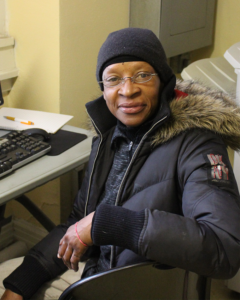A Home is a Foundation

Photo from The NOAH Project
Even when it is temporary, the experience of homelessness is traumatic and life-altering — a tragedy experienced by thousands of individuals and families every year. A home is the foundation for so many aspects of life, supporting a wide range of our needs and aspirations, from basic health and safety to stable employment and the generational transfer of wealth. Losing or not having a home makes it nearly impossible to maintain good health, stay employed or in school, and feel hopeful about the future. And we find it unconscionable that so many people in our country and our community suffer this hardship, usually due to circumstances beyond their control.
This is why the McGregor Fund recently announced our commitment to spend $5 million over the next two years on holistic approaches to end homelessness in Detroit. We undertake this new, deeper work both with a sense of urgency and with inspiration from the work of organizations around the country and here in Detroit — organizations that have developed dynamic solutions to the wide range of challenges that stem from and contribute to homelessness.
The NOAH Project (Networking, Organizing and Advocating for the Homeless) is one such organization, and a key grantee partner of the Fund. A core philosophy has guided NOAH’s evolution from its founding in 1999 as a free lunch program: a commitment to permanent housing solutions for clients and an insistence on fully coordinated services to meet their other needs.
Clients first meet NOAH by dropping into their day programs at Central United Methodist Church in downtown Detroit or through the agency’s street outreach. “Everyone who walks through our door has had some sort of trauma. We work to acknowledge that and treat people with respect and dignity in the middle of all of that, and really work with people to recognize that while they’re at a point of high need right now, they also have a lot of assets and gifts,” explains Amy Brown, NOAH’s executive director. “We build relationships with clients so that they are able to trust a service provider, because they haven’t for a long time. We work to change the narrative with a lot of clients — to show them we’re in this together, and to provide that supportive network that a lot of clients don’t get.”
As they work to build trust, NOAH staff offer clients crisis intervention, case management, advocacy, and counseling services that meet them where they are, both physically and psychologically. NOAH addresses what they can on site and, over time as clients are ready, carefully connects them to a wide range of outside service agencies to address other needs, helping them to navigate the frustrating and onerous journey to permanent housing. This patient, holistic approach explains how NOAH is able to work successfully with clients far beyond a placement in temporary housing.
“We’re talking about years of poor education in Detroit, lack of jobs, racial disparities — all the problems that contribute to homelessness,” explains Brown. “We’ve got to look at housing, but then also look at education and employment, at health and human services, at medical and mental health care, and begin to figure out how to build a more robust network of services that is addressing all of those things.”
Since 2018, NOAH has also been a Coordinated Assessment Model, or CAM site — a formal point of entry for people seeking connection to Detroit’s federally-funded housing and social resources for homeless individuals and families. All clients are assessed for the variety of needs and strengths they bring with them, and their assessment data is entered into both CAM’s data system tracking local needs by population, as well as the State of Michigan’s Homeless Management Information System (HMIS), a centralized database utilized by providers serving the homeless. HMIS allows providers to work with other agencies to coordinate care for the complex needs clients have, and to track clients’ engagement with all participating service providers over time to look for signs of progress or challenge. At NOAH, case managers and wellness workers thoroughly document client-level data and carefully track clients’ progress.
NOAH’s focus on thorough data documentation and tracking is an essential best practice that must be embraced across homeless-serving agencies in order to get at issues of individual program quality and to implement a system-wide approach for continuous improvement. While adapting to a data-intensive approach can be painful for tight-budget agencies staffed by people whose talents lie in their counseling and interpersonal skills, success stories from other cities teach us that it is a prerequisite for a robust and effective community-wide effort to end homelessness. As Brown puts it: “As providers, we’ve been fragmented — so what we’re focused on now is [using data to] get everyone in the same book, in terms of what kinds of services each of our agencies is providing to whom, and then getting on the same page about the quality of those services.”
NOAH’s grounding in street-level, direct service work and its embrace of data-centered practice have created a leadership opportunity for the agency within Detroit’s Continuum of Care (CoC), the citywide planning body that oversees resource allocation and policy for federally-funded agencies working to address family and individual homelessness. Since January 2019, Brown has served as chair of that body, bringing fresh energy and a clear vision of how Detroit’s system of providers and stakeholders needs to improve in order to help their shared clients achieve better, more lasting housing and quality of life outcomes. The McGregor Fund has supported her leadership role with supplemental funding to NOAH’s razor-thin budget for additional staff resources, allowing her to spend time away from the agency without placing additional strain on NOAH’s modest staffing. We are excited to see other leaders coalescing around Brown’s vision and, together, building momentum to bring about hard, overdue, but achievable change in our community’s approach to ending homelessness.



